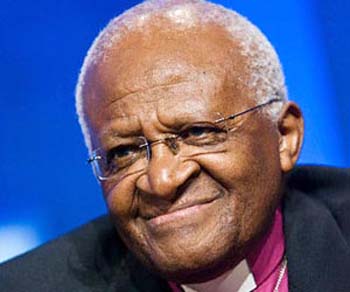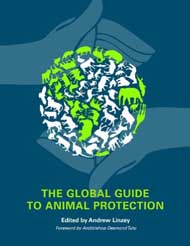Well, here already is something much more important than the vagaries of my health.
I’ve been consistently rebuked in the last couple of years for speaking about our treatment of other creatures in human terms, and daring to suggest that the same rules of decency should apply.
I’ve been comparing the badger cull to the indiscriminate massacres of human beings in history, and likening the fight for justice for animals to the fight against slavery, and discrimination against women.
Now Desmond Tutu has spoken. I’m awestruck actually, because he is expounding the very same beliefs – and much more eloquently than I am able.

Archbishop Desmond Tutu is one of the world’s greatest fighters for justice and equality, and was a leader along, alongside Nelson Mandela, in the battle to rid South Africa of racial discrimination. I’m going to print Tutu’s whole pronouncement here, and its context, because I believe this is one of the most important speeches ever made, and perfect to guide us in the New Year and beyond.
Please read carefully !
Love
Bri
PRESS RELEASE:
IMMEDIATE: 28 December 2013
We must fight injustice to animals as we do injustice to blacks, women and gays – Archbishop Desmond Tutu
“I have spent my life fighting discrimination and injustice, whether the victims are blacks, women, or gays and lesbians. No human being should be the target of prejudice or the object of vilification or be denied his or her basic rights.
“But there are other issues of justice – not only for human beings but also for the world’s other sentient creatures. The matter of the abuse and cruelty we inflict on other animals has to fight for our attention in what sometimes seems an already overfull moral agenda. It is vital, however, that these instances of injustice not be overlooked.
“I have seen firsthand how injustice gets overlooked when the victims are powerless or vulnerable, when they have no one to speak up for them and no means of representing themselves to a higher authority. Animals are in precisely that position. Unless we are mindful of their interests and speak out loudly on their behalf, abuse and cruelty go unchallenged.
“It is a kind of theological folly to suppose that God has made the entire world just for human beings, or to suppose that God is interested in only one of the millions of species that inhabit God’s good earth,” says Archbishop Desmond Tutu in his forthright foreword to the Global Guide to Animal Protection to be published by the University of Illinois on 30 December.
In his first major statement on animal welfare Archbishop Tutu says “Our dominion over animals is not supposed to be despotism. We are made in the image of God, yes, but God – in whose image we are made – is holy, loving, and just. We do not honor God by abusing other sentient creatures.
If it is true that we are the most exalted species in creation, it is equally true that we can be the most debased and sinful. This realization should give us pause … There is something Christ-like about caring for suffering creatures, whether they are humans or animals.”
 Archbishop Tutu concludes with his warm support for the Global Guide to Animal Protection and urges the reader to seek justice and protection for all creatures, humans and animals alike: “Churches should lead the way by making clear that all cruelty – to other animals as well as human beings – is an affront to civilized living and a sin before God.”
Archbishop Tutu concludes with his warm support for the Global Guide to Animal Protection and urges the reader to seek justice and protection for all creatures, humans and animals alike: “Churches should lead the way by making clear that all cruelty – to other animals as well as human beings – is an affront to civilized living and a sin before God.”
Desmond Tutu is archbishop emeritus of Cape Town and won the Nobel Peace Prize for his anti-apartheid work. Nelson Mandela described Tutu as: “sometimes strident, often tender, never afraid and seldom without humour, Desmond Tutu’s voice will always be the voice of the voiceless”.
The Global Guide to Animal Protection is the result of collaboration between the Oxford Centre for Animal Ethics, a world-wide association of academics from all disciplines, and the University of Illinois Press. Raising awareness of human indifference and cruelty toward animals, The Global Guide includes more than 180 introductory articles that survey the extent of worldwide human exploitation of animals from a variety of perspectives.
In addition to entries on often disturbing examples of human cruelty toward animals, the book provides inspiring accounts of attempts by courageous individuals – including Jane Goodall, Shirley McGreal, Biruté Mary Galdikas, Bernard E. Rollin, and Roger Fouts – to challenge and change exploitative practices.
The volume is edited by Oxford theologian Professor Andrew Linzey. Linzey is a member of the Faculty of Theology at the University of Oxford and director of the Oxford Centre for Animal Ethics (www.oxfordanimalethics.com). Coeditor of the Journal of Animal Ethics, he has written or edited more than twenty books, including Animal Theology, Animals on the Agenda: Questions about Animals for Theology and Ethics, and Why Animal Suffering Matters: Philosophy, Theology, and Practical Ethics.
The Global Guide to Animal Protection is published in both the UK and USA on 30 December and is available from www.press.uillinois.edu/books/catalog/69wgp5qn9780252036354.html priced USD95 (cloth) and USD27 (paper). [Amazon]
ends
For more press information please contact Sam Calvert, Samantha Calvert Marketing & PR, sam@samcalvert.plus.com / +44 (0)1782 505430 / +44 (0)7967 042050 or Steve Fast, Publicity Manager for the University of Illinois Press, sfast@illinois.edu/ 217-244-4689. Review copies are available by contacting Steve Fast sfast@illinois.edu.
About the Oxford Centre for Animal Ethics
The Oxford Centre for Animal Ethics, founded in 2006 by its director Professor Andrew Linzey, is an independent Centre with the aim of pioneering ethical perspectives on animals through academic, research, teaching and publication. The Centre has more than 70 Fellows drawn from a variety of academic disciplines from throughout the world. For more information about the Centre and its Fellows please see its website at www.oxfordanimalethics.com
About the University of Illinois Press
Founded in 1918, the University of Illinois Press ranks as one of the USA’s larger and most distinguished university presses. It publishes works of high quality for scholars, students, and the citizens of the state and beyond. The University of Illinois Press also published the Journal of Animal Ethics in partnership with the Oxford Centre for Animal Ethics.
Copyright © 2013 Oxford Centre for Animal Ethics, All rights reserved.
Our mailing address is:
Oxford Centre for Animal Ethics
91 Iffley Road
Oxford, England OX4 1EG
United Kingdom
PLEASE OBSERVE COPYRIGHT
© brianmay.com